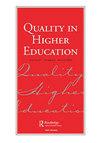比较视角下的欧洲高等教育认证:斯洛文尼亚和荷兰
IF 1.5
Q3 EDUCATION & EDUCATIONAL RESEARCH
引用次数: 3
摘要
本文从认证的角度论述了欧洲高等教育的质量保证。为了减少对西方(欧洲)国家比较研究的偏见,它调查了斯洛文尼亚和荷兰高等教育的认证附属于哪些做法,并在此基础上确定其发展和实施中的关键相似点和差异。首先,探讨了各国国家指导文件中的认证程序。其次,在访谈结果的支持下,它解决了其在实践中的实施问题。结果表明,在过去五年中,两国都对认证框架进行了重大改革,以增加机构对质量保证程序的责任。然而,认证也成为国家(政治)行为者的有效工具,以指导高等教育系统朝着或多或少控制的方向发展,因此,在审查的两种情况下,挑战机构质量文化的促进。本文章由计算机程序翻译,如有差异,请以英文原文为准。
Accreditation in European higher education from the comparative perspective: Slovenia and the Netherlands
ABSTRACT This article addresses quality assurance in European higher education from the perspective of accreditation. To reduce the bias in favour of comparative research of Western (European) countries, it investigates which practices are attached to accreditation in Slovenian and Dutch higher education and identifies on this basis key similarities and differences in its development and implementation. First, it explores accreditation procedures in national steering documents of each country. Second, it addresses its implementation in practice with the support from results obtained with interviews. Results showcase that in the past five years, both countries made significant changes to the accreditation framework to increase institutional responsibility for quality assurance procedures. However, accreditation also became an efficient tool for national (political) actors, to guide the development of higher education systems in the direction of more or less control and, hence, to challenge the promotion of institutional quality culture in both cases examined.
求助全文
通过发布文献求助,成功后即可免费获取论文全文。
去求助
来源期刊

Quality in Higher Education
EDUCATION & EDUCATIONAL RESEARCH-
CiteScore
3.30
自引率
14.30%
发文量
32
期刊介绍:
Quality in Higher Education is aimed at those interested in the theory, practice and policies relating to the control, management and improvement of quality in higher education. The journal is receptive to critical, phenomenological as well as positivistic studies. The journal would like to publish more studies that use hermeneutic, semiotic, ethnographic or dialectical research as well as the more traditional studies based on quantitative surveys and in-depth interviews and focus groups. Papers that have empirical research content are particularly welcome. The editor especially wishes to encourage papers on: reported research results, especially where these assess the impact of quality assurance systems, procedures and methodologies; theoretical analyses of quality and quality initiatives in higher education; comparative evaluation and international aspects of practice and policy with a view to identifying transportable methods, systems and good practice; quality assurance and standards monitoring of transnational higher education; the nature and impact and student feedback; improvements in learning and teaching that impact on quality and standards; links between quality assurance and employability; evaluations of the impact of quality procedures at national level, backed up by research evidence.
 求助内容:
求助内容: 应助结果提醒方式:
应助结果提醒方式:


